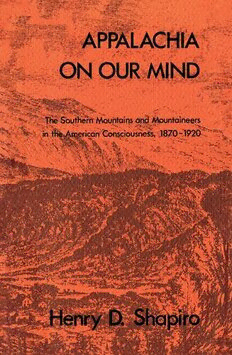
Appalachia on Our Mind: The Southern Mountains and Mountaineers in the American Consciousness, 1870-1920 PDF
Preview Appalachia on Our Mind: The Southern Mountains and Mountaineers in the American Consciousness, 1870-1920
Appalachia on Our Mind This page intentionally left blank Appalachia on Our Mind The Southern Mountains and Mountaineers in the American Consciousness, 1870-1920 by Henry D. Shapiro The University of North Carolina Press Chapel Hill Copyright © 1978 by The University of North Carolina Press All rights reserved Manufactured in the United States of America ISBN 0-8078-1293-5 Library of Congress Catalog Card Number 77-2301 Library of Congress Cataloging in Publication Data Shapiro, Henry D. Appalachia on our mind. Bibliography: p. Includes index. i. Appalachian Mountains, Southern. I. Title. F217.^65 £52 30i.29'74 77-2301 ISBN 0-8078-1293 -5 THIS BOOK WAS DIGITALLY MANUFACTURED. For my great teachers, Joseph Shapiro and Harry Wolf son This page intentionally left blank Contents Preface / ix 1 The Local-Color Movement and the "Discovery" of Appalachia / 3 2 Protestant Home Missions and the Institutionalization of Appalachian Otherness / 32 3 Solving the "Problem" of Appalachian Otherness: The Role of History and Environment / 59 4 Solving the "Problem" of Appalachian Otherness: The Role of Ethnicity and Culture / 85 5 Naming as Explaining: William Goodell Frost and the Invention of Appalachia / 113 6 Region as Community and the Transformation of Mountain Benevolence / 133 7 Economic Modernization and the Americanization of Appalachia / 157 8 The Southern Highland Division and the Institu- tionalization of Appalachian Regionalism / 186 9 Creating Community and Culture in Appalachia: Folk Schools and the Crafts Revival / 213 10 The Folksong Revival and the Integration of the Mountaineers into Modern American Civilization: The Triumph of Pluralism / 244 Notes / 267 Bibliography / 309 Index / 369 Preface This is not a history of Appalachia. It is a history of the idea of Appalachia, and hence of the invention of Appalachia. It attempts to examine the origins and consequences of the idea that the moun- tainous portions of eight or nine southern states form a coherent region inhabited by an homogeneous population possessing a uni- form culture. It argues that the emergence of this idea, between 1870 and 1900, involved an attempt to understand reality, or more pre- cisely reality perceived in a particular way from a particular point of view, and it seeks to explicate the manner in which the idea of Appa- lachia came to be used as a way of dealing with the "strange land and peculiar people" of the southern mountains. It is thus a history of America and of the American consciousness, for its concern is with the attempts of Americans to understand the nature and meaning of their civilization, and to develop modes of action which to them seem consonant with this understanding. And as such it is itself an attempt to understand the nature and meaning of American civilization, and hence part of a larger work in which Americans have been engaged for some two hundred years. At another level, the concern of this book is with the taxonomy of reality, the process by which experience is defined, ordered, organ- ized into coherent and actionable schemes, the process by which a new reality or reality newly perceived is integrated into existing knowledge, the process by which taxonomic schemes are rearranged to make space for new knowledge, the process by which knowledge becomes the basis for public action. Because this is an essay in intel- lectual history, it begins with the assumption that the way people view the world determines how they will act in it. It attempts, how- ever, to go beyond conventional studies of the history of ideas and of the history of "influences" by recognizing that the pattern of relation- ships between ideas and action is significantly more complex than the cause-and-effect model we often use in talking about the role of ideas [ix]
